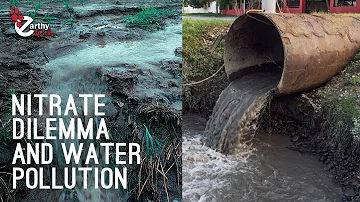Can nitrates cause pollution?
Table des matières
- Can nitrates cause pollution?
- What is nitrate water pollution?
- Can nitrates be harmful to the environment?
- Why do nitrates pollute the ocean?
- Are nitrates harmful to humans?
- How much nitrate is toxic to humans?
- How do nitrates affect wildlife?
- Are nitrates water pollutants?
- How do nitrates affect fish?
- What can nitrates cause?
- What are to sources cause nitrate pollution?
- What are the health risks of nitrate?
- How does nitrate affect drinking water?
- What is effect of nitrates on pollution?

Can nitrates cause pollution?
The acceptable concentration of nitrate in water is 10 mg NO3-N/l; anything more can have harmful effects and can lead to nitrate water pollution (Camargo et al., 2005). ... Nitrate pollution can lead to the destruction of the one place we can call home: planet Earth.
What is nitrate water pollution?
Possible sources of nitrate contamination in water include agricultural N fertilizer, industrial wastewater discharges, urban domestic sewage, septic systems, human waste lagoons, animal feedlots, native soil organic matter, and atmospheric N deposition.
Can nitrates be harmful to the environment?
The environmental impacts of nitrate pollution include ecological and amenity damage to our rivers, lakes and coasts; higher costs, energy use and carbon emissions for drinking water treatment and long-term impacts for our groundwater.
Why do nitrates pollute the ocean?
Basically, any excess nitrate in the water is a source of fertilizer for aquatic plants and algae. In many cases, the amount of nitrate in the water is what limits how much plants and algae can grow. If there is an excess level of nitrates, plants and algae will grow excessively.
Are nitrates harmful to humans?
Nitrate is in some lakes, rivers, and groundwater in Minnesota. You cannot taste, smell, or see nitrate in water. Consuming too much nitrate can be harmful—especially for babies. Consuming too much nitrate can affect how blood carries oxygen and can cause methemoglobinemia (also known as blue baby syndrome).
How much nitrate is toxic to humans?
The oral lethal dose for humans was estimated to range from mg of nitrite per kg of body weight, the lower doses applying to children and elderly people. Toxic doses giving rise to methaemoglobinaemia ranged from 0. mg/kg of body weight (WHO, 1996).
How do nitrates affect wildlife?
The main toxic action of nitrate is due to the conversion of oxygen-carrying pigments to forms that are incapable of carrying oxygen. Nitrate toxicity to aquatic animals increases with increasing nitrate concentrations and exposure times.
Are nitrates water pollutants?
It is particularly harmful to infants. In California, nitrate is one of the most common groundwater contaminants. While 98 percent of the state's community water systems meet all primary drinking water standards, between 10 to 15 percent of the public wells exceed the state's standards for nitrate.
How do nitrates affect fish?
Over time high levels of nitrate can build up which is bad for the fish and the plants in the tank. The result of a build-up of nitrates is that fish are more susceptible to disease, it lowers their ability to reproduce and can reduce their growth.
What can nitrates cause?
Nitrate is a compound that naturally occurs and has many human-made sources. ... Consuming too much nitrate can affect how blood carries oxygen and can cause methemoglobinemia (also known as blue baby syndrome).
What are to sources cause nitrate pollution?
- Nitrate contamination occurs in surface water and groundwater, leaching into the soil and from there into the water supply from various sources. Irrigation water containing fertilizers is a common culprit as are septic systems, wastewater treatment plants, dairies and natural conditions.
What are the health risks of nitrate?
- It's thought that sodium nitrate may damage your blood vessels, making your arteries more likely to harden and narrow, leading to heart disease. Nitrates may also affect the way your body uses sugar, making you more likely to develop diabetes.
How does nitrate affect drinking water?
- Excessive levels of nitrate in drinking water have caused serious illness and sometimes death, especially in young infants. The harmful effect in adults and infants occurs when nitrate is converted in the body to nitrite . This interferes with the oxygen-carrying capacity of the blood, resulting in a condition called “methaemoglobinaemia”.
What is effect of nitrates on pollution?
- INTRODUCTION. Nitrates occur naturally in the environment. ...
- EFFECTS ON THE ENVIRONMENT. Excess levels of nitrate in bodies of water,mainly resulting from anthropogenic contributors such as agriculture,pose a major threat to the environment.
- PREVENTION. ...
- GOVERNMENT INTERVENTION. ...
- NITRATE POLLUTION IN HALTON. ...
- CONCLUSION. ...
- WORK CITED. ...












